
About Our Program
The SDSU Big Data Analytics (BDA) Program is a transdisciplinary program across technology, business, engineering, science, and social science domains leading to a Master of Science Degree in Big Data Analytics at San Diego State University. The two-year program is operated in a collaborative and active transdisciplinary educational environment for students and professionals who wish to advance their knowledge and skills in the fast growing fields of data science, artificial intelligence, and data analytics. Big Data are the fundamental infrastructure to facilitate the advancement of artificial intelligence (A.I.) technologies. Many technological breakthroughs, such as Generative AI, Large Language Models (LLMs), Metaverse, and Digital Twin technology, are depending on the collection, training, analysis, and transformation of Big Data. This BDA program is to meet the strong demand for data analytic and A.I. jobs in the era of data-intensive and knowledge-based economy.
We will begin accepting student applications on October 1 each year. This program adopts rolling admissions. Due to limited capacity, we encourage students to submit their application to graduate admissions as early as possible to receive priority consideration for admission (by December 15 each year). Please go to the Graduate Admission website for steps to apply.
Big Data Analytics (BDA) is a dynamic approach to uncovering patterns, unknown correlations, and other useful insights from diverse, large-scale datasets. Although BDA is related to data science, statistics, artificial intelligence, and geospatial technologies, its focuses is on business discoveries from big data by using available software tools, such as data mining, machine learning, computational linguistics, geographic information systems (GIS), social network analysis, financial and marketing analytics, spatiotemporal data analysis, and time-frequency analysis.
SDSU BDA program is unique in the Southern California and admits students with background in social science, linguistics, arts, business, GIS, biology, and public health, in addition to those with background in engineering or computer science. Unlike most comparable programs, the SDSU BDA is a low-cost and flexible program that can meet each student’s need by customizing individual graduate Program of Studies (POS). Located in the finest city of America, SDSU continues to ascend its position as a leader in higher education. It is already ranked in the top 140 national universities and in the top 70 public universities in U.S. News & World Report's annual ranking of America's Best Colleges in 2018. FORBES magazine ranked SDSU No. 23 on its list of America's Most Entrepreneurial Universities, while U.S. News and World Report ranked SDSU’s entrepreneurship program No. 21 among the nation’s public universities.
The objective of the program is to produce technically competent students with the skills necessary to explore and identify research and business opportunities provided by Big Data across various application domains, such as information technology, geographic information systems (GIS), social and behavioral science, digital humanities, public health, business analytics, and biotechnology. The program has a dual-core design for students to learn both computational skills (programming languages and software) and analytical methods (data mining, statistics, machine learning, spatiotemporal analysis, visualization) for data models and business applications.
Upon completion of our program students will develop competencies in:
- The management and analysis of Big Data applications with appropriate programming tools, statistical models, social theories, business concepts, and analytic software.
- The use of the outcomes of analytics to formulate research hypotheses and to guide decision-making processes in academic or business settings.
- Leading organizations in collecting, cleaning, organizing, analyzing, and modeling data for various applications.
Download the digital copy of the brochure, or request printed copies by emailing [email protected].
- Articulate the basic principles of statistical inference and data analytical methods,
including statistics, machine learning and spatiotemporal analysis.
- Apply appropriate computational skills and tools to collect, clean, summarize, analyze,
and visualize Big Data in real world applications.
- Demonstrate proficiency in data analytic software, programming languages, and database
management tools.
- Present quantitative data analysis results effectively in both oral and written formats.
- Identify research challenges in data ethics, data privacy, and legal issues involved in the collection, storage, analysis, reporting, and distribution of Big Data.
Important Information
For the Fall 2026 admission applications, a GRE or GMAT score is required for applicants
with an undergraduate GPA of below 3.2 or with a degree in a non-quantitative field
so that the applicants can demonstrate the requisite quantitative knowledge. Quantitative
fields generally include business, economics, GIScience, computer science, engineering,
mathematics, biology, physical sciences, etc.
In the News
- Congratulations to our BDA student, Hrushik Nimesh Mehta and his team members won the first place at the AWS x Cal Poly AI Hackathon hosted at SDS (October 24, 2025). Their project title is “PrepPal - AI Interview
Coach”, which is an AI-powered interview preparation platform that provides personalized
feedback and real-time performance analysis to help students improve their interview
skills.
- BDA Director, Dr. Ming-Hsiang Tsou, and four BDA faculty members (Dr. Audrey Beck, Dr. Atsushi Nara, Dr. Xiaobai Liu, and Dr. Gabriela Fernandez) received $450,000 from National Science Foundation to develop Geospatial Artificial
Intelligent (GeoAI) technologies to study the dynamic changes of the homeless population
in the County of San Diego. Read more about the grant on SDSU NewsCenter.
- Welcome our new 2025 BDA student cohort (22 students) (first photo) and our 2024 student cohort (second photo)!

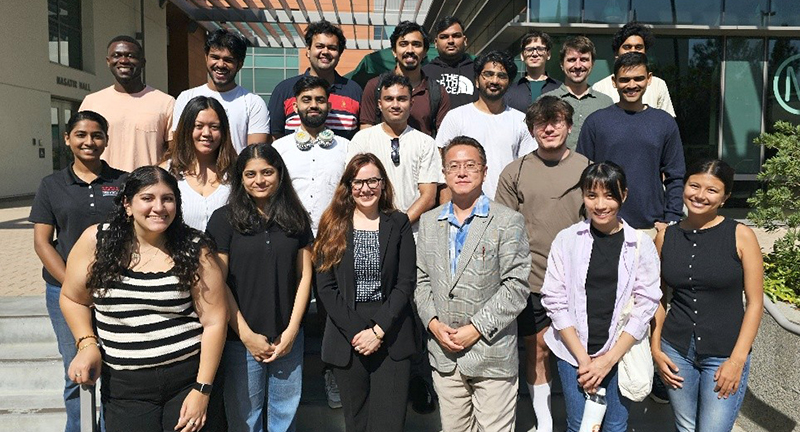
- Alexandra Nguyen (BDA student) presented “Ethical, Legal, and Social Issues (ELSI) in Geospatial Artificial
Intelligence (GeoAI) Applications” at the 2025 American Association of Geographers (AAG) annual meeting in Detroit, Michigan.
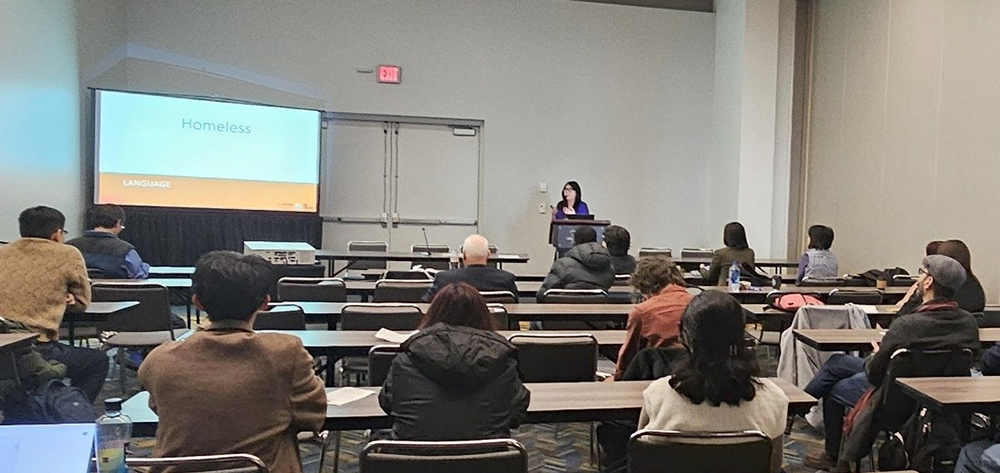
- Congratulations to our Class 2025 Graduates in the BDA Commencement event (5/18/2025).
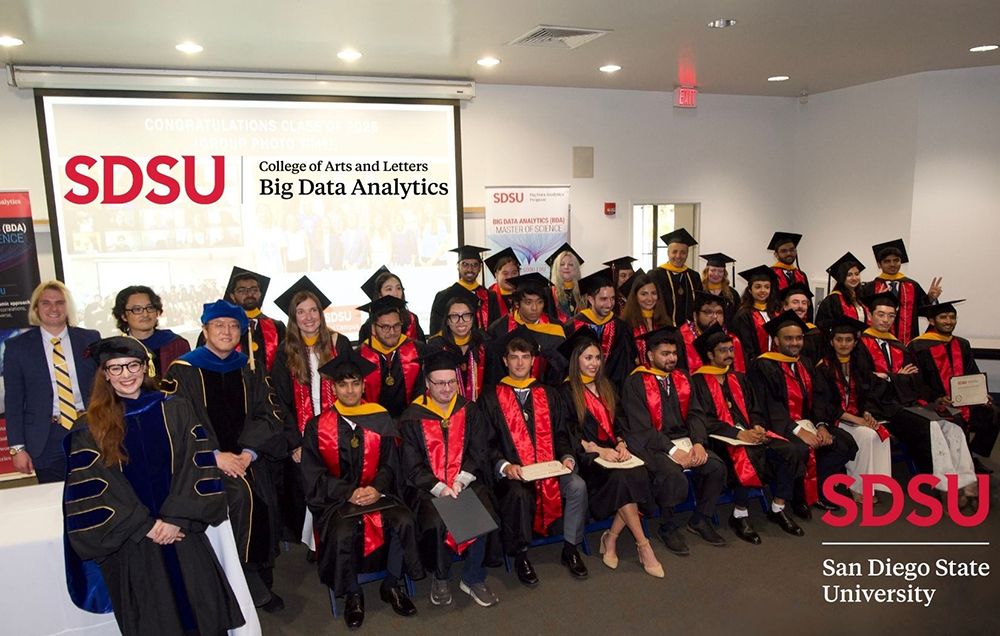
- Congratulations to our BDA Students receiving the following awards and scholarships:
- Palash Suryawanshi has been awarded the 2025-2026 Master’s Research Scholarship (MRS). (Each semester $5000 for two semesters, total: $10,000 scholarship).
- Fernanda Carrillo, has been selected as a Hispanic Serving Institution Award recipient for the 2025 SDSU Student Symposium (S³). Mentor: Dr. Gabriela Fernandez.
- Siddharth Suresh Babu, has been selected as a Dean’s Award: Arts and Letters recipient for the 2025 SDSU Student Symposium (S³). Mentor: Dr. Gabriela Fernandez.
- Welcome our new 2024 BDA student cohort (25 students) (first photo) and our 2023 student cohort (second photo)!
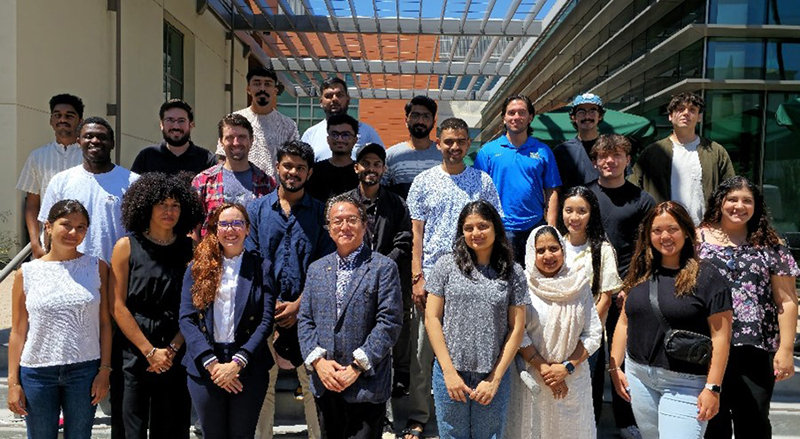
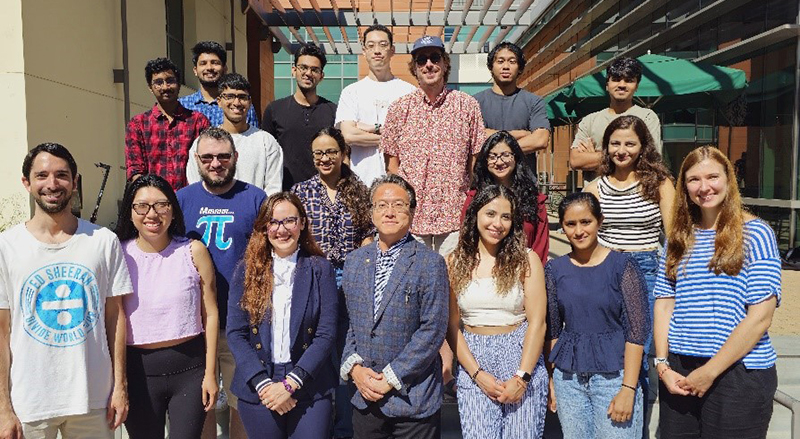
- Congratulations to our BDA Students receiving the following awards and scholarships:
- Susheel Chebrolu has been awarded the 2024-2025 Master’s Research Scholarship (MRS). (Each semester $5000 for two semesters, total: $10,000 scholarship).
- Pranjal Patel has been awarded the 2024-2025 Presidential Graduate Research Fellowship (PGRF), waives the $420 per unit charge for coursework for one academic year of student’s
graduate program at SDSU (valued at approximately $5,000-15,000 depending on course
load).
- Congratulations to our BDA students who received the SDSU Student Research Symposium (S3) Awards (March 1, 2024):
- Fernanda Carrillo Escarcega (Left Photo): Provost’s Award (Arts and Letters). Poster Title: Empowering Women's Well-being: A Comprehensive Approach to Social Health Disparities. Mentors: Dr. Gabriela Fernandez and Dr. Domenico Vito.
- Anurima Saha (Right Photo): Graduate Research Excellence Award, Research Title: Predicting Crime Resolution in Los Angeles, Mentor: Dr. Ming-Hsiang Tsou.
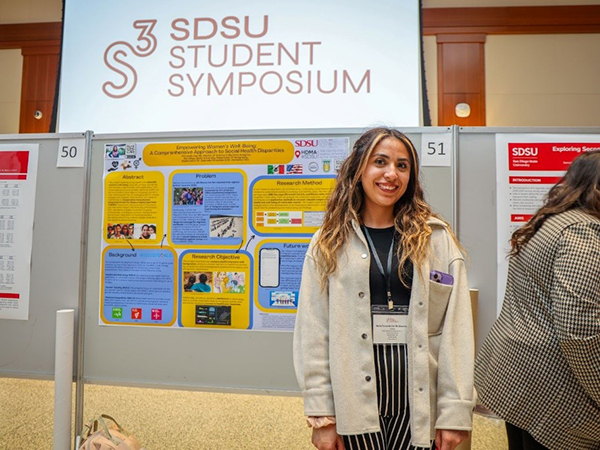
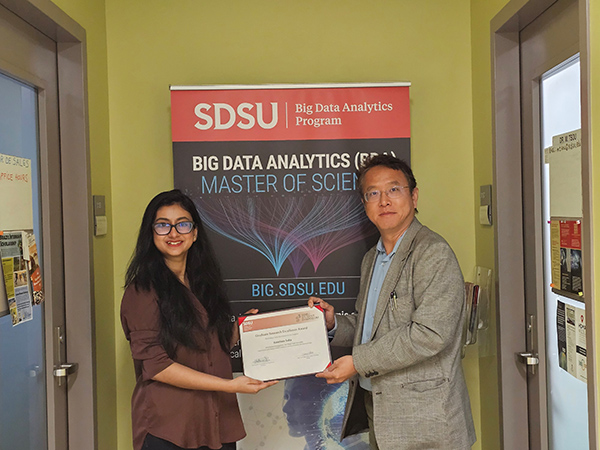
- Congratulations to our BDA program FOUR faculty members (Dr. Ming-Hsiang Tsou, Dr. Piotr Jankowski, Dr. Serge Rey, and Dr. Brian Spitzberg). They are listed in the 2023 World's Top 2% Scientists List (Academic Career) published by Stanford University. There are total 80 faculty members
at San Diego State University included in this list.
- Starting in Fall 2023 semester, the SDSU Global Campus created a new ONLINE only Big Data Analytics Program (no GRE or GMAT requirement for the online program applications). The Global Campus BDA program is independent from the SDSU on-campus BDA program. Global Campus courses cannot be transferred or used in the on-campus BDA program.